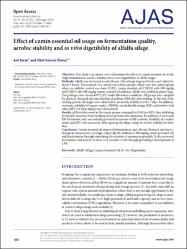| dc.contributor.author | Turan, Aslı | |
| dc.contributor.author | Soycan Önenç, Sibel | |
| dc.date.accessioned | 2022-05-11T14:46:37Z | |
| dc.date.available | 2022-05-11T14:46:37Z | |
| dc.date.issued | 2018 | |
| dc.identifier.issn | 1011-2367 | |
| dc.identifier.issn | 1976-5517 | |
| dc.identifier.uri | https://doi.org/10.5713/ajas.17.0834 | |
| dc.identifier.uri | https://hdl.handle.net/20.500.11776/10335 | |
| dc.description.abstract | Objective: This study was carried out to determine the effects of cumin essential oil on the silage fermentation, aerobic stability and in vitro digestibility of alfalfa silages. Methods: Alfalfa was harvested at early bloom (5th cutting) stage in October and wilted for about 3 hours. The research was carried out at three groups which were the control group where no additive control was done (CON), cumin essential oil (CMN3) with 300 mg/kg and CMN5 with 500 mg/kg cumin essential oil addition. Alfalfa was ensiled in plastic bags. The packages were stored at 8 degrees C +/- 2 degrees C under laboratory conditions. All groups were sampled for physical, chemical and microbiological analysis 120th day after ensiling. At the end of the ensiling period, all silages were subjected to an aerobic stability test for 7 days. In addition, enzimatic solubility of organic matter (ESOM), metabolizable energy (ME), and relative feed value (RFV) of these silages were determined. Results: pH level decreased in the cumin groups compared to CON (p<0.05), thus inhibiting proteolytic enzymes from breaking down proteins into ammonia. In addition, it increased ESOM amount, and concordantly provided an increase of ME contents. Similarly, dry matter intake and RFV ratio increased. After opening the silage, it kept its aerobic stability for three days. Conclusion: Cumin essential oil improved fermentation, and affected chemical and microbiological characteristics of silages. Especially the addition of 300 mg/kg cumin provided cell wall fractionation through stimulating the activities of enzymes responsible. It also increased the number and activity of lactic acid bacteria (LAB) through providing a development of LAB. | en_US |
| dc.description.sponsorship | NKUBAP (University of Namik Kemal Scientific Research Project)Namik Kemal University [NKUBAP.00.24.YL.14.04] | en_US |
| dc.description.sponsorship | This study was funded by NKUBAP (University of Namik Kemal Scientific Research Project) within the framework of NKUBAP.00.24.YL.14.04. It was taken form MSc Thesis. | en_US |
| dc.language.iso | eng | en_US |
| dc.publisher | Asian-Australasian Assoc Animal Production Soc | en_US |
| dc.identifier.doi | 10.5713/ajas.17.0834 | |
| dc.rights | info:eu-repo/semantics/openAccess | en_US |
| dc.subject | Alfalfa | en_US |
| dc.subject | Silage | en_US |
| dc.subject | Cumin | en_US |
| dc.subject | Essential Oil | en_US |
| dc.subject | In vitro Digestibility | en_US |
| dc.subject | Formic-Acid | en_US |
| dc.subject | Lactic-Acid | en_US |
| dc.subject | Inoculant | en_US |
| dc.subject | Additives | en_US |
| dc.subject | Oregano | en_US |
| dc.subject | Fiber | en_US |
| dc.title | Effect of cumin essential oil usage on fermentation quality, aerobic stability and in vitro digetibility of alfalfa silage | en_US |
| dc.type | article | en_US |
| dc.relation.ispartof | Asian-Australasian Journal of Animal Sciences | en_US |
| dc.department | Fakülteler, Ziraat Fakültesi, Zootekni Bölümü | en_US |
| dc.identifier.volume | 31 | en_US |
| dc.identifier.issue | 8 | en_US |
| dc.identifier.startpage | 1252 | en_US |
| dc.identifier.endpage | 1258 | en_US |
| dc.institutionauthor | Turan, Aslı | |
| dc.institutionauthor | Soycan Önenç, Sibel | |
| dc.relation.publicationcategory | Makale - Uluslararası Hakemli Dergi - Kurum Öğretim Elemanı | en_US |
| dc.authorscopusid | 57202732052 | |
| dc.authorscopusid | 48761910600 | |
| dc.authorwosid | Önenç, Sibel Soycan/ABA-3503-2020 | |
| dc.identifier.wos | WOS:000436173000023 | en_US |
| dc.identifier.scopus | 2-s2.0-85049130742 | en_US |
| dc.identifier.pmid | 29514436 | en_US |



















